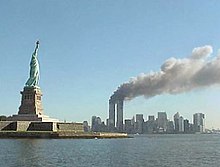terror

The Terror ( Lat. Terror "terror") is the systematic and often seemingly arbitrary spread of fear and terror exercised by or threatened violence to make people docile. According to UN Security Council Resolution 1566 , "acts of terrorism are those committed with the intent of killing or serious bodily harm, or for the purpose of being hostage-taking, and with the purpose of creating a state of terror, intimidating a population or forcing a government, for example relevant terrorism treaties are recorded ".
The use of terror to achieve political, economic or religious goals is called terrorism .
Concept history
Terror was originally a legitimate action attributed to the state among the ancient thought leaders of the Enlightenment . For Thomas Hobbes of "terror of legal punishment" (was terror of legal punishment ) is a necessary condition of a state, which on the other side "of the terror of power" ( the terror of some power ) corresponded.
On the eve of the French Revolution (1789), the scouts revolted and accused the monarchy of being a terrorist regime of terror ( par la terreur ). In 1769, Voltaire also referred to the state-staged public torture practice prior to wheeled executions and being torn to pieces as the “apparatus of terror” ( appareil de terreur ). However, it was the French revolutionaries themselves who, from 1793 with Robespierre, proclaimed terror as a state instrument of power and gave it ideological justification in the period known as the " reign of terror ".
In a “virtuous state” the people are to be guided by reason and the enemies of the people are to be ruled by “terreur” , Robespierre said before the convention on February 5, 1794: “Terror is nothing other than rapid, strict and indomitable justice. It is a revelation of virtue. Terror is not a special principle of democracy, but arises from its principles, which must be the most urgent concern of the fatherland's heart. ” The executive organ of this state terror , the Paris Revolutionary Tribunal , Robespierre finally fell victim to himself that same year.
Colloquial usage
The term terror can now be found in numerous word combinations (e.g. telephone terror , psychological terror ) also in everyday language, where it often stands for aggressive manners or extreme harassment such as stalking .
literature
- Peter Fischer (ed.): Speeches of the French Revolution . DTV, Munich 1989, ISBN 3-423-02959-5 .
- Ernst Federn: An attempt at a psychology of terror. In: Roland Kaufhold (Ed.): Ernst Federn: Attempts for the psychology of terror. Psychosozial, Giessen 1999, pp. 35-75.
- Roland Kaufhold: On the psychology of the extreme situation: The trauma of the persecuted (B. Bettelheim and E. Federn). In: ders .: Bettelheim, Ekstein Federn: Impulses for the psychoanalytic-pedagogical movement. Psychosozial, Giessen 2001, pp. 253-262.
- Raúl Páramo-Ortega: Fundamentalists are always the other. Freud in the age of fundamentalism. Extended version 2008 (full text.)
- Yana Milev: Emergency Empire: Transformation of the State of Emergency. Springer, Vienna 2008, ISBN 978-3-211-79811-9 .
- Philipp H. Schulte: Terrorism and anti-terrorism legislation - a legal sociological analysis. Waxmann, Münster 2008, ISBN 978-3-8309-1982-7 .
Individual aspects
- Igmade ( Stephan Trüby et al., Ed.): 5 Codes: Architecture, Paranoia and Risk in Times of Terror . Basel. Boston, Berlin 2006, ISBN 3-7643-7597-3 .
- Jörg Baberowski , Anselm Doering-Manteuffel : Order through terror. Excessive violence and extermination in the National Socialist and Stalinist empires. Dietz, Bonn 2006, ISBN 3-8012-0368-9 .
- Ursula Hennigfeld (Ed.): Poetics of Terror. Narrative of September 11, 2001 in an intercultural comparison. Winter, Heidelberg 2014, ISBN 978-3-8253-6261-4 .
Web links
Individual evidence
- ↑ For example, Kai Ambos reported in the Frankfurter Allgemeine Zeitung on October 2, 2014, page 11, under the title Who is a Terrorist?
